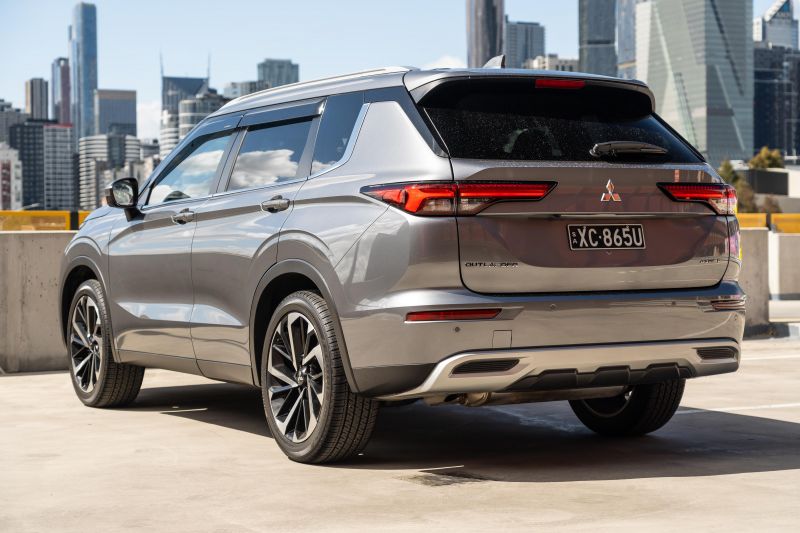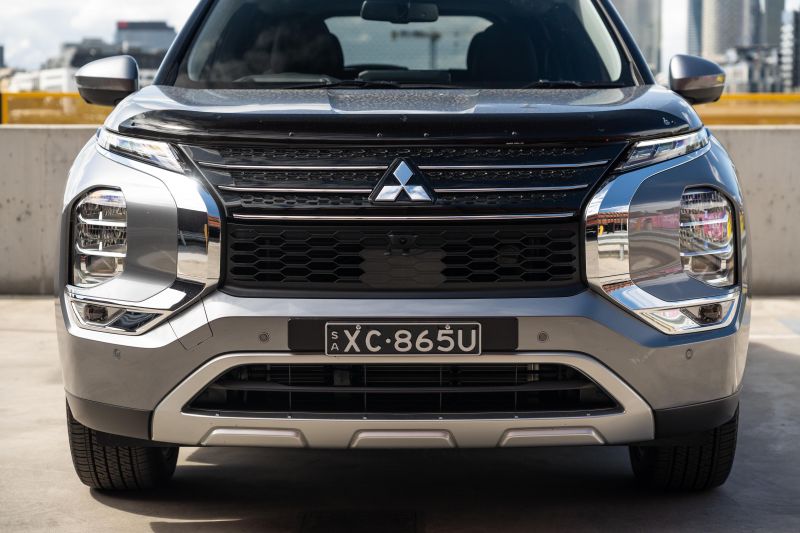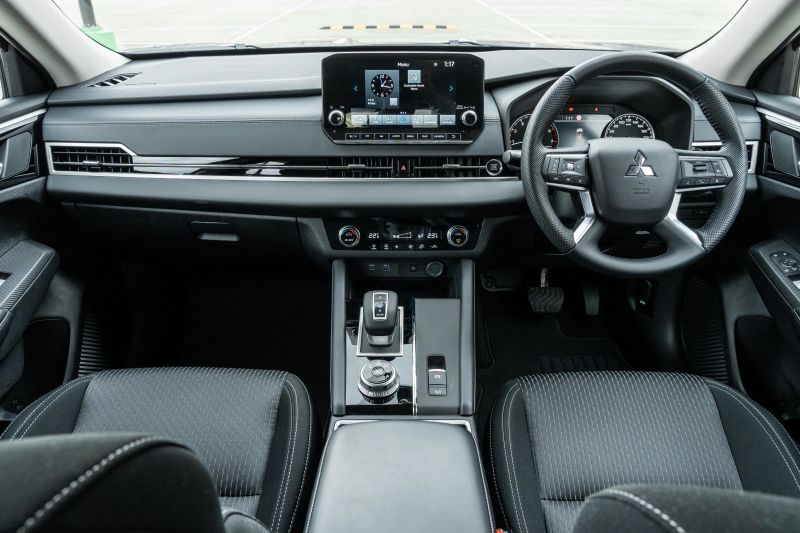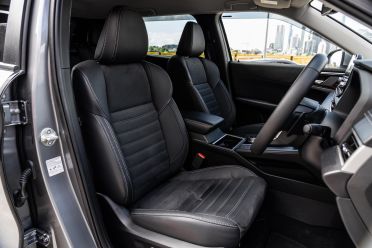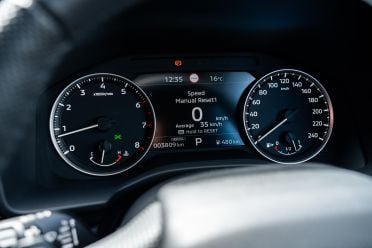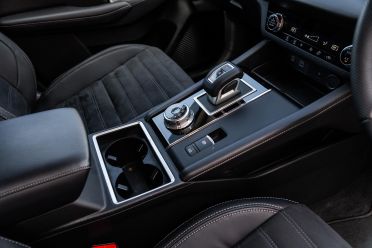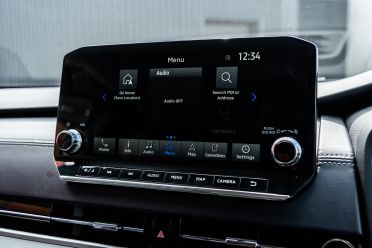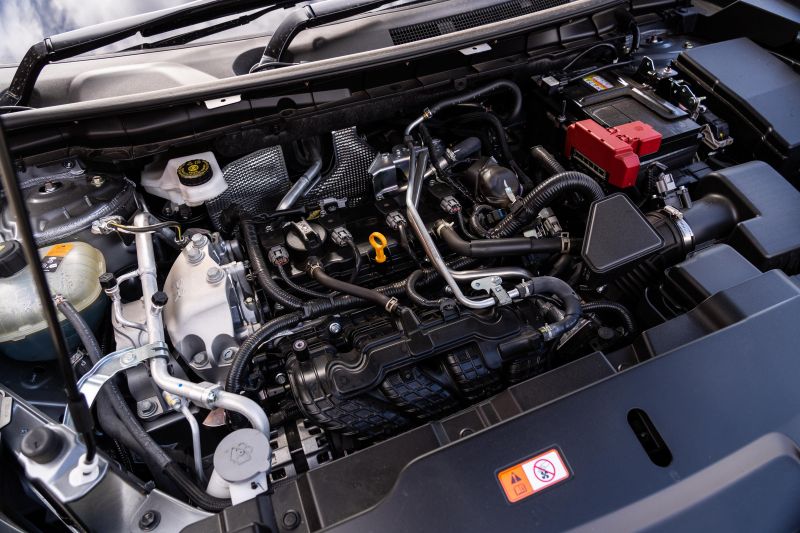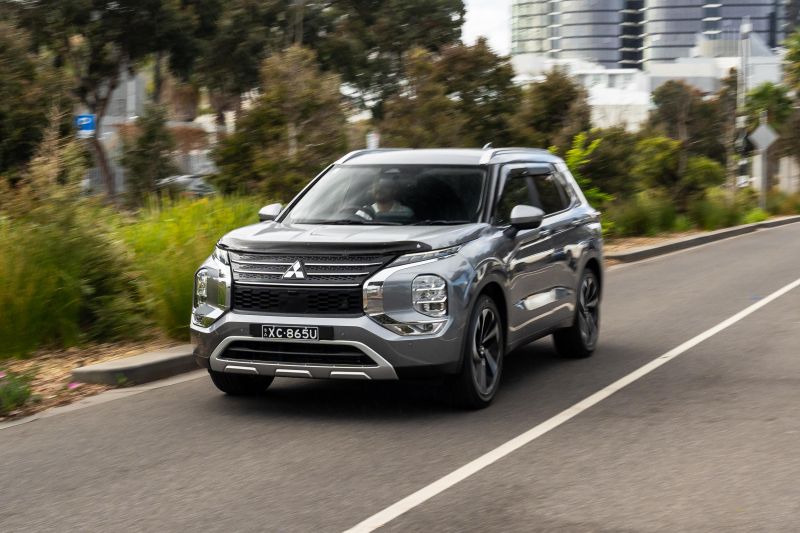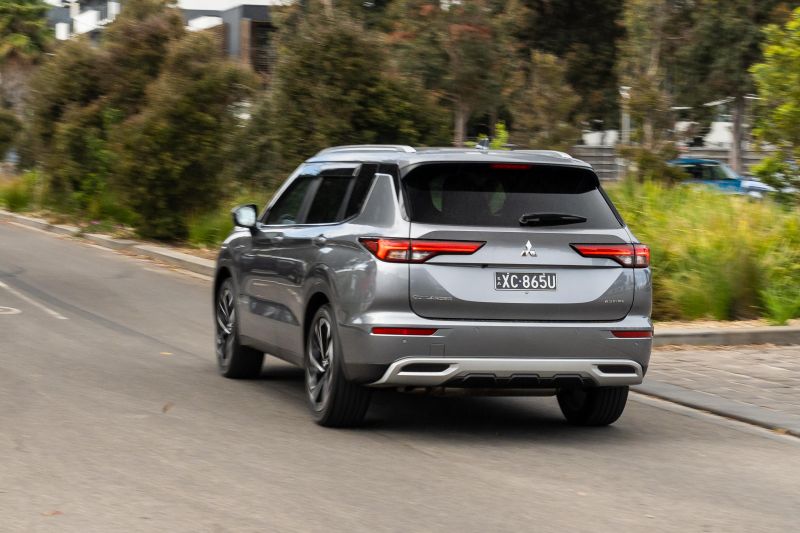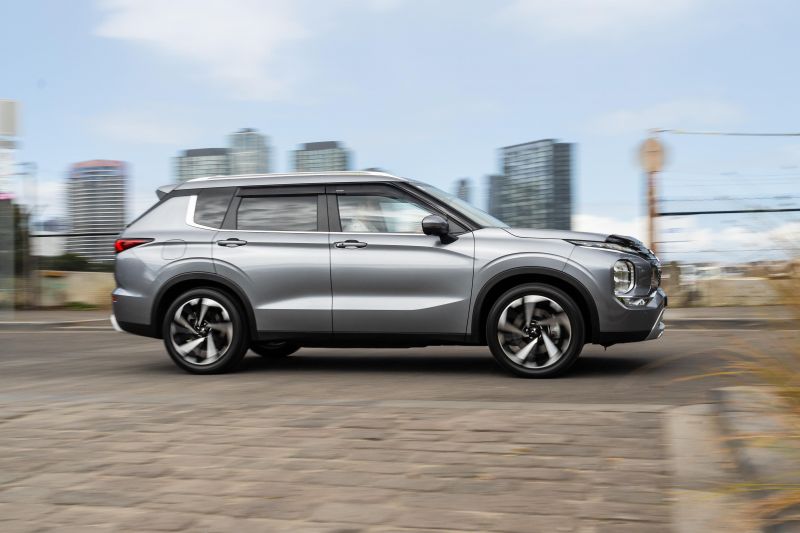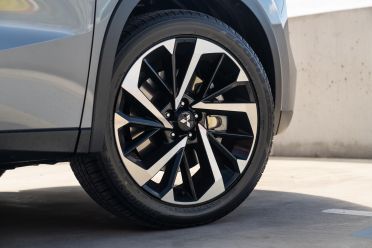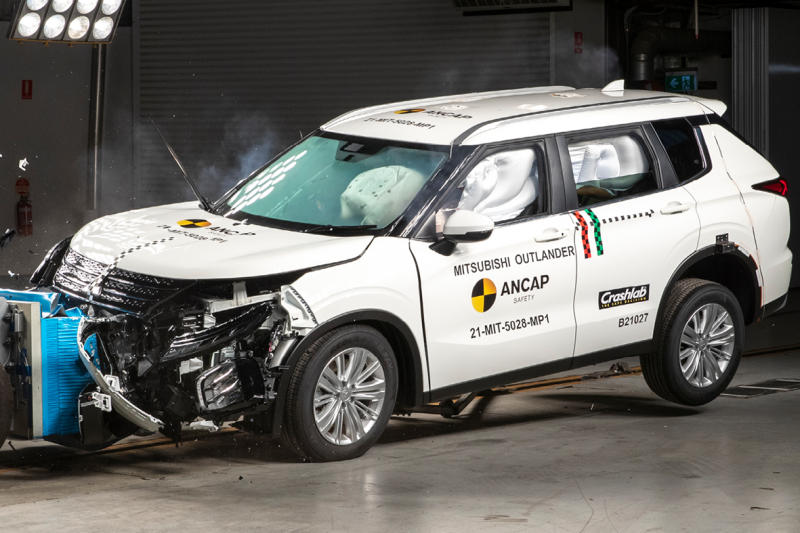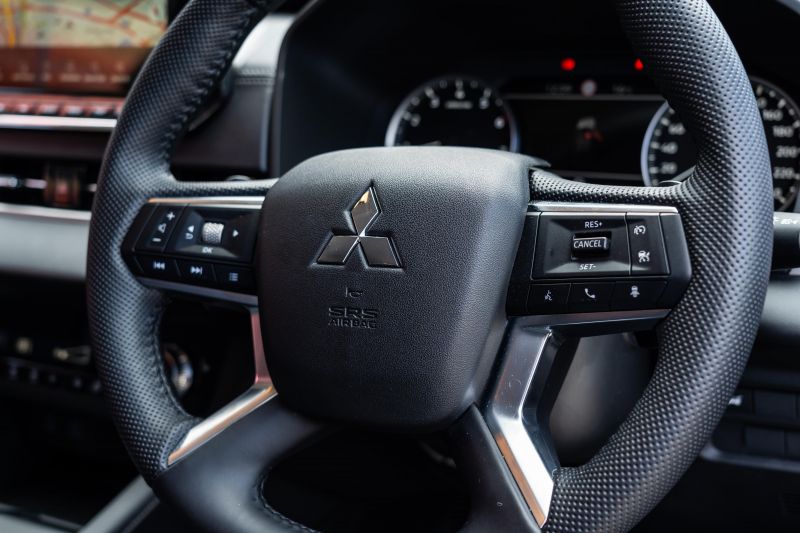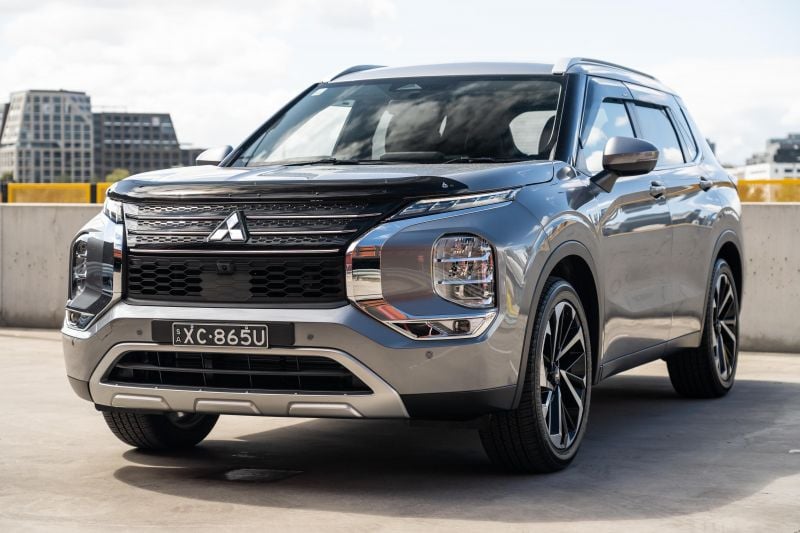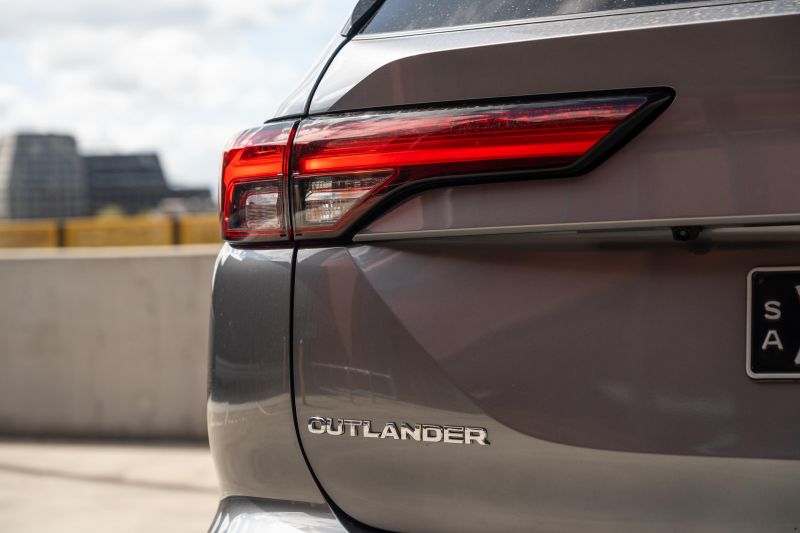The Mitsubishi Outlander continues to be one of Australia’s top-selling SUVs, with more than 15,000 delivered between January and August this year.
Only the Toyota RAV4 has outsold it from its class, with the Mitsubishi narrowly outgunning other big-name rivals such as the Mazda CX-5, Hyundai Tucson and Subaru Forester this year.
Eye-catching design (with big wheels and the right paint in particular), a well-thought-out interior with tons of space, decent pricing, and the availability of a 10-year warranty all play their part in the car’s success.
Here we revisit the upper-mid-level Outlander Aspire petrol – which you can expect to drive away from the dealer for under $50,000.
How does the Mitsubishi Outlander fare vs its competitors?
View a detailed breakdown of the Mitsubishi Outlander against similarly sized vehicles.
Mitsubishi
Outlander
How much does the Mitsubishi Outlander Aspire cost?
The Aspire petrol is $44,240 before on-road costs as a front-wheel drive (FWD) like the one tested here, with all-wheel drive (AWD) commanding an additional $2500.
It sits in the middle of the Outlander range, above the ES and LS, and beneath the Exceed and Exceed Tourer. The Aspire is also the most luxurious variant available with FWD.
The Outlander Aspire chief competitors on price are mid-upper range variants of top-sellers like the Toyota RAV4, Mazda CX-5, Hyundai Tucson, Kia Sportage, and Nissan X-Trail – which shares the Mitsubishi’s platform.
However, unlike these main competitors (aside from the Nissan), the Outlander offers a third seating row, suited mostly to kids, for added versatility.
So, it can just as easily be cross-shopped against slightly larger and more expensive ‘5+2’ vehicles like the Hyundai Santa Fe and Kia Sorento.
2024 Mitsubishi Outlander prices
- Outlander ES FWD: $37,240
- Outlander ES AWD: $39,740
- Outlander LS FWD: $40,740
- Outlander LS AWD: $43,240
- Outlander Aspire FWD: $44,240
- Outlander Aspire AWD: $46,740
- Outlander Exceed AWD: $51,990
- Outlander Exceed Tourer AWD: $54,490
- Outlander ES PHEV: $56,490
- Outlander Aspire PHEV: $62,990
- Outlander Exceed PHEV: $68,490
- Outlander Exceed Tourer PHEV: $70,990
Prices before on-road costs
What is the Mitsubishi Outlander Aspire like on the inside?
The Outlander Aspire has a standard proximity-sensing key fob and auto-unfolding side mirrors, as well as microsuede and synthetic leather seats with quite generous side and thigh bolstering.
Both front seats are heated at this spec level, but only the driver’s side has powered adjustments: the front-passenger seat is manual.
The wheel is wrapped in high-quality leather with tastefully perforated hand grips, and feels like it belongs in a more expensive car. It also offers ample telescopic and height adjustments.
While the Exceed comes with digital instruments, the Aspire comes with traditional analogue speedometer and tachometer flanking a digital trip computer, augmented by a head-up display. A downgrade, in other words.
In terms of materials Mitsubishi has made a clear effort. There are lots of padded touchpoints and silver inserts, as well as minimal use of annoying glossy black trim, aside from a slim strip along the dash and transmission tunnel.
However, there are signs of some cost-saving. For instance, the door cards flex when pressed and the transmission tunnel creaks when you knee it hard. Nevertheless, in terms of look and feel the 2023 Outlander does well enough, and is infinitely more interesting than the old model so beloved by fleets.
The 9.0-inch centre touchscreen is mounted high and offers embedded navigation (not cloud-based) and a combined overhead and rear camera view with acceptably clear resolution, albeit not as crystal-clear as some newer entrants such as the Haval H6.
There’s wired and wireless Apple CarPlay, and wired Android Auto (too bad for me with my Pixel 7 Pro!) for those who prefer phone mirroring, plus AM/FM/DAB+ receivers, USB-A and USB-C ports, and a wireless charger.
I’d just note here that the related Nissan X-Trail comes with a larger 12.3-inch touchscreen running a slicker infotainment system which isn’t available in the Outlander.
Climate controls are operated by buttons and dials rather than touchscreen or haptic pads, which is excellent, and there are two front temperature zones. In uncommonly warm September weather the AC held its own, as evidenced by my wife turning the temperature on her side up.
Storage options include bottle-friendly door bins, a rubberised phone storage cubby in front of the stubby by-wire gear shifter, two toothed cupholders, a smallish console and glovebox, and a sunglasses holder in the roof.
There’s no big open hidden section under the transmission tunnel, which some competitors using a shift-by-wire setup find space to offer. This is a shame since hiding things from prying eyes is important.
I’ve no gripes with back-seat space though. I’m 194cm and had ample leg, toe and head room behind my own driving position, and the middle-row bench both slides on rails and reclines. The back of each front seat also has three separate pockets, rather than the customary one.
Amenities back here include rear air vents and USB ports, reading lights, coat hooks, damped grab handles and a full ski port with cupholders. There’s a small driveline hump along the centre but the middle seat is relatively comfortable – as far as this segment goes.
Unlike many competitors; including the Toyota RAV4, Mazda CX-5, Hyundai Tucson and Kia Sportage, the Outlander offers a third seating row.
Rather than a full-size seven-seater it’s more of a ‘5+2’, but the rearmost row is handy for special occasions and certainly child-friendly.
Access is via the kerbside portion of the centre bench, which is easy to slide and tilt at once. When not in use the third row of seats stow neatly into the floor, with the headrests stashed away in their own separate compartment.
The boot is powered and well-thought-out. It has neat underfloor storage for the rigid cargo cover bar (with pull-out vinyl piece), levers to fold down the centre row from the rear, bag hooks, a 12V socket and deep cubbies behind each rear wheel well. There’s a space-saver spare tyre too.
Boot capacity measures 478L with the third row of seats folded, in a floor area that’s 974mm long by 1380mm wide (1070mm between the wheel arches), by 870mm tall.
There’s still 163L of storage with seats six and seven deployed (you can have one down and one up if you prefer). With the middle seat rows folded there’s a 1461L loading area that’s 1.7m long.
What’s under the bonnet?
The standard engine is a 2.5-litre naturally aspirated four-cylinder petrol shared with the Nissan X-Trail, producing 135kW of power and 244Nm of torque.
The engine is mated to a CVT automatic with eight pre-set speeds in manual override mode, and front-wheel drive. For a further $2500 you can option on-demand all-wheel drive, which Mitsubishi dubs ‘Super-All Wheel Control’.
The engine runs on 91 RON fuel and Mitsubishi quotes an ADR combined-cycle fuel efficiency figure of 7.7 litres per 100km. The fuel tank is 55 litres.
The Aspire also comes with a plug-in hybrid (PHEV) option offering around 80km of EV range plus a petrol engine-generator, with standard AWD. However given it costs an extra $16,000, it’s never the easiest sell.
How does the Mitsubishi Outlander Aspire drive?
While the Outlander does well when it comes to interior space, value-for-money and even design, it’s no class-leader when it comes to driving dynamics.
Positives first: the driving position is commanding and outboard visibility is good. There are also blind-spot alerts and a very helpful head-up display projected onto the windscreen.
The 2.5-litre petrol engine offers good initial response and the lack of a turbocharger means it’s more linear. It’s not a sports machine but it offers decent pep, even if the CVT sounds a little monotonous and drone-like when you’re overtaking.
There are also various modes controlled by the round dial next to the gear shifter. These can dull (Eco) or sharpen (Tarmac) the accelerator response, to respectively save fuel or boost acceleration.
The fuel use claim is achievable. I was averaging 8.0L/100km doing mostly highway driving, but a combined-cycle figure around 8.5L/100km is very possible without much effort.
I would definitely recommend considering the AWD option. Mitsubishi’s S-AWC system with Active Yaw Control and a Mud terrain calibration mode is one of the better systems of its type on the market. It promises an added dose of versatility, which is always good to have.
Now to the not-so-good. While we do not expect family SUVs to be corner-carvers, we do expect them to be comfortable, and the Outlander on its 20-inch wheels has a tendency to transmit a fair bit of a jarring into the interior over sharp impacts such as expansion joints or potholes.
The vehicle has all-round independent suspension but the damper tuning on compression needs some work.
The electric power steering system is light and free of resistance, but also a little vague right off centre, meaning I found myself making regular minor corrections. The body control in corners is acceptably tied down but more feedback through the wheel would be welcome.
This plus the expansive and tall bonnet makes the Outlander (4.7m long with an 11.2m turning circle) feel larger than it actually is.
In terms of other driver-assist features, the adaptive cruise control worked excellently at matching the speed of the car ahead but the lane-keeping assist uses vibrations and selective wheel braking rather than direct steering intervention to halt a lane-departure, like most competitors.
If the ride quality was better I’d give the Outlander a pass. Those prioritising comfort might do well to look at the Outlander LS, which has 18-inch wheels with some more cushioning tyre sidewall.
What do you get?
Outlander ES highlights:
- FWD or AWD
- 5 seater
- 18-inch wheels
- Full-size spare tyre
- LED headlights and daytime running lights
- Front and rear parking sensors
- Rear-view camera
- Button start
- Cloth seat trim
- Two-zone climate control
- 8.0-inch touchscreen
- Android Auto – wired
- Apple CarPlay – wired
- USB-C, USB-A and 12V sockets
- Digital radio receiver
Outlander LS adds:
- FWD or AWD
- 7 seater
- Proximity-sensing key fob
- Dusk-sensing headlights
- Rain-sensing wipers
- Space-saver spare tyre
- Rear privacy glass
- Roof rails
- LED fog lights
- Auto-folding, heated side mirrors
- Auto-dimming rear-view mirror
- 9.0-inch touchscreen
- Apple CarPlay – wireless
- Satellite navigation
- Wireless phone charger
- Second-row USB ports
- Leather-wrapped steering wheel
Outlander Aspire adds:
- FWD or AWD
- 7 seater
- 20-inch wheels
- Auto-levelling and adaptive LED headlights
- Powered tailgate
- Microsuede and synthetic leather seats
- Heated front seats
- Powered driver’s seat adjustment
- Head-up display
- Surround-view camera
Outlander Exceed adds:
- AWD only
- 7 seater
- Panoramic sunroof
- Hands-free powered tailgate
- Leather seats with memory modes
- Powered front passenger seat
- Sunshade in rear door trim
- Tri-zone climate control (rear added)
- 10-speaker Bose audio upgrade
- 12.3-inch digital instruments
- Heated steering wheel
- Front LED sequential indicators
Outlander Exceed Tourer adds:
- AWD only
- 7 seater
- Two-tone paint
- Higher-grade leather trim
- Massaging front seats
- Heated rear seats
Paint choice:
- White
- Cosmic Blue – $740
- Sterling Silver – $740
- Titanium – $740
- Red Diamond – $940
- White Diamond – $940
- Black Diamond – $940
Key accessories:
- Protection pack – $1342 and fitted here
- Bonnet and window wind deflectors
- Floor and luggage mats
- Floor mats – $216 (normal) or $350 (all weather)
- Dashcam – $364
- Rear window sunshades (roll-up) – $552
- Towbar kit – $1457
- Trailer brake controller – $815
- Rigid cargo barrier – $1433
- Roof rack cross bars – $643
You’d have to say based on this that the LS looks like the rear value play.
Is the Mitsubishi Outlander Aspire safe?
The Outlander carries a five-star ANCAP safety rating with a 2022 date stamp.
It scored 83 per cent for adult occupants, 92 per cent for child occupants, 81 per cent for vulnerable road-user protection, and 83 per cent for safety assist features.
Standard safety features include:
- 8 airbags
- 2 x ISOFIX and 3 x top tethers
- AEB with pedestrian detection
- AEB when reverse parking
- Drowsy driver monitor
- Blind-spot monitoring
- Rear cross-traffic alert
- Lane departure alert
- Lane keeping assist via braking
- Traffic-sign recognition
- Adaptive cruise control
There are a few more driver assist aids on the Exceed and Exceed Tourer including auto lane-centring, Traffic Jam Assist (which re-engages the adaptive cruise control in stop/start driving), and a speed limiter that can use road camera inputs to match the current speed limit for you.
While these features aren’t cheap, one might expect to see them on the Aspire – if not the fleet-focused ES.
How much does the Mitsubishi Outlander Aspire cost to run?
Mitsubishi provides up to 10 years or 200,000km of warranty, whichever comes first. This is the longest warranty in the market in terms of years, but not mileage.
However the caveat is that owners must have their vehicle serviced at a Mitsubishi dealer. Otherwise the warranty reverts to five years or 100,000km, or ends if the non-dealer service took place beyond this point in time.
On the plus side most dealer services are reasonably well priced, though not quite as cheap as Toyota. The first five visits cost $299, $349, $299, $349 and $299, before the sixth jumps to $649.
The first 12 months of ownership are also covered by 12 months of roadside assist and motoring club membership.
In my opinion it’s worth servicing your vehicle at the dealer to keep the decade of warranty, particularly if you sell the vehicle without super-high mileage after five or so years like a lot of people – at which point you’ll probably get slightly better resale value.
CarExpert’s Take on the Mitsubishi Outlander Aspire
The Outlander gets a lot right. It turns heads, has lots of room for the family including the occasional-use third row, is relatively affordable to run, and has up to a decade of warranty.
It’s a solid bet in the well-stocked family SUV race, a vehicle that straddles the medium and large SUV segments from a brand with runs on the board.
But don’t expect much in the way of driving pleasure, with room for improvement in areas like engine refinement and ride comfort.
Moreover, at Aspire spec level it would benefit from a better touchscreen and the full suite of driver assist functions.
Click the images to view the full gallery
BUY: Mitsubishi Outlander
MORE: Everything Mitsubishi Outlander

